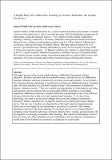| dc.contributor.author | O'Neill, Susan | |
| dc.contributor.author | Scott, Murray | |
| dc.contributor.author | Conboy, Kieran | |
| dc.date.accessioned | 2013-02-25T10:49:27Z | |
| dc.date.available | 2013-02-25T10:49:27Z | |
| dc.date.issued | 2011 | |
| dc.identifier.citation | O'Neill, S,Scott, M,Conboy, K (2011) 'A Delphi study on collaborative learning in distance education: The faculty perspective'. British Journal Of Educational Technology, 42 :939-949. | en_US |
| dc.identifier.uri | http://hdl.handle.net/10379/3265 | |
| dc.description.abstract | This paper focuses on the factors that influence collaborative learning in distance education. Distance education has been around for many years and the use of collaborative learning techniques in distance education is becoming increasingly popular. Several studies have demonstrated the superiority of collaborative learning over traditional modes of learning and it has been identified as a potential solution to some of the weaknesses of traditional distance education courses. There are a rapidly growing number of technologies in use today and educators and practitioners face an increasingly difficult challenge to successfully implement collaborative learning in distance education; precipitated not only from technical advances but also from wider social and organisational concerns. To the best of our knowledge, this study is the first to investigate the factors that influence collaborative learning in distance education, by eliciting the opinions of an expert panel using a Delphi survey. The aim was to produce an integrated list of the most important implementation factors and to investigate the role that technology is perceived to contribute. The findings identified 17 of the most important factors; these factors cover a range of themes including course rationale and design, instructor characteristics, training, group dynamics, the development of a learning community and technology. The potential of technology, however, does not seem to be fully realised and newer technologies such asmulti-user environments would seem to be of limited use in practice according to the expert panel. | en_US |
| dc.language.iso | en | en_US |
| dc.relation.ispartof | British Journal Of Educational Technology | en |
| dc.rights | Attribution-NonCommercial-NoDerivs 3.0 Ireland | |
| dc.rights.uri | https://creativecommons.org/licenses/by-nc-nd/3.0/ie/ | |
| dc.subject | Environments | en_US |
| dc.subject | Technology | en_US |
| dc.title | A Delphi study on collaborative learning in distance education: The faculty perspective | en_US |
| dc.type | Article | en_US |
| dc.date.updated | 2013-02-07T14:46:48Z | |
| dc.identifier.doi | 10.1111/j.1467-8535.2010.01132.x | |
| dc.local.publishedsource | http://dx.doi.org/10.1111/j.1467-8535.2010.01132.x | en_US |
| dc.description.peer-reviewed | peer-reviewed | |
| dc.contributor.funder | |~| | |
| dc.internal.rssid | 2196903 | |
| dc.local.contact | Murray Scott, Dept. Of Accountancy & Finance, Room 367, Cairnes Building, Nui Galway. 5286 Email: murray.scott@nuigalway.ie | |
| dc.local.copyrightchecked | No | |
| dc.local.version | ACCEPTED | |
| nui.item.downloads | 1036 | |


